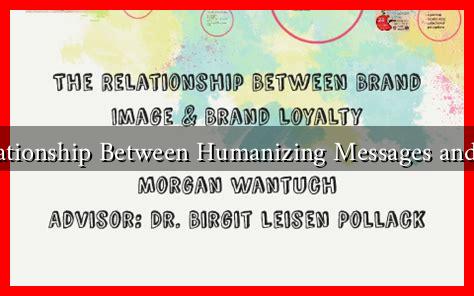-
Table of Contents
- What Is the Relationship Between Humanizing Messages and Brand Loyalty?
- The Importance of Humanizing Messages
- How Humanizing Messages Foster Brand Loyalty
- 1. Emotional Connection
- 2. Trust and Credibility
- 3. Community Building
- Case Studies: Brands That Excel in Humanizing Messages
- Statistics Supporting the Connection
- Conclusion
What Is the Relationship Between Humanizing Messages and Brand Loyalty?
In today’s competitive marketplace, brands are constantly seeking ways to connect with consumers on a deeper level. One effective strategy that has emerged is the use of humanizing messages. These messages aim to create a more relatable and authentic brand image, fostering emotional connections with consumers. But how exactly do these humanizing messages influence brand loyalty? This article explores the relationship between humanizing messages and brand loyalty, supported by examples, case studies, and relevant statistics.
The Importance of Humanizing Messages
Humanizing messages refer to communication strategies that present a brand as relatable, approachable, and empathetic. This approach contrasts with traditional marketing tactics that often focus solely on product features and benefits. By incorporating human elements into their messaging, brands can create a more engaging narrative that resonates with consumers. Here are some key aspects of humanizing messages:
- Authenticity: Consumers are increasingly drawn to brands that exhibit genuine values and beliefs.
- Storytelling: Narratives that reflect real-life experiences can create emotional connections.
- Empathy: Understanding and addressing consumer pain points fosters trust and loyalty.
How Humanizing Messages Foster Brand Loyalty
Brand loyalty is defined as a consumer’s commitment to repurchase or continue using a brand’s products or services. Humanizing messages play a crucial role in building this loyalty through several mechanisms:
1. Emotional Connection
Humanizing messages evoke emotions, which are powerful drivers of consumer behavior. When consumers feel emotionally connected to a brand, they are more likely to remain loyal. For instance, Dove’s “Real Beauty” campaign challenged traditional beauty standards and celebrated diversity. This approach resonated with many consumers, leading to increased brand loyalty and sales growth.
2. Trust and Credibility
Brands that communicate transparently and authentically are perceived as more trustworthy. According to a study by Edelman, 81% of consumers said that they need to be able to trust the brand to buy from them. Brands like Patagonia, which emphasizes environmental sustainability and ethical practices, have built a loyal customer base by aligning their messaging with their values.
3. Community Building
Humanizing messages often foster a sense of community among consumers. Brands that engage with their audience through social media, user-generated content, and interactive campaigns create a feeling of belonging. For example, Starbucks encourages customers to share their coffee experiences on social media, creating a community of brand advocates who feel connected to the brand and each other.
Case Studies: Brands That Excel in Humanizing Messages
Several brands have successfully implemented humanizing messages to enhance brand loyalty:
- Coca-Cola: The “Share a Coke” campaign personalized the brand by replacing its logo with popular names, encouraging consumers to share their experiences. This campaign led to a 2% increase in sales in the U.S.
- Airbnb: By showcasing real hosts and their stories, Airbnb humanizes its platform, making it more relatable. This approach has contributed to a loyal customer base that values authentic travel experiences.
- Ben & Jerry’s: The brand’s commitment to social justice and environmental issues resonates with consumers, fostering loyalty among those who share similar values.
Statistics Supporting the Connection
Research supports the notion that humanizing messages can significantly impact brand loyalty:
- A study by the Harvard Business Review found that emotionally connected customers are more than twice as valuable as highly satisfied customers.
- According to a report by Accenture, 66% of consumers are more likely to switch brands if they feel that a company does not understand them.
- Research from Sprout Social indicates that 70% of consumers feel more connected to brands with a human element.
Conclusion
The relationship between humanizing messages and brand loyalty is clear: brands that prioritize authenticity, emotional connection, and community engagement are more likely to cultivate loyal customers. As consumers increasingly seek meaningful relationships with the brands they support, companies must adapt their messaging strategies to resonate on a human level. By doing so, they not only enhance brand loyalty but also create a sustainable competitive advantage in the marketplace.
For further reading on the impact of emotional branding, check out this insightful article on Forbes.


